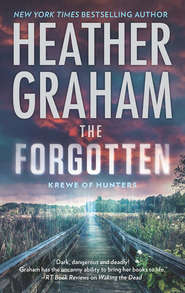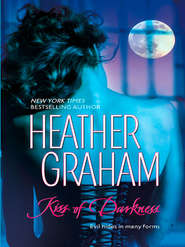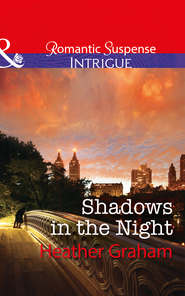По всем вопросам обращайтесь на: info@litportal.ru
(©) 2003-2024.
✖
Let the Dead Sleep
Автор
Год написания книги
2019
Настройки чтения
Размер шрифта
Высота строк
Поля
Seeing the sights—at his urging—while he did his buying and collecting. He had spoiled her, yes. But he’d also taught her to be courteous and caring. He’d never walked away from anyone who needed help, whether it was a confused tourist seeking directions or a homeless veteran or down-and-outer needing food and shelter—or a ride to detox.
“I will go see the bust, okay? I’ll do what I can for Mrs. Simon.”
Billie nodded. “That’s what your dad would want.”
“I’m trying to keep his legacy alive,” she told the pair. “Now, if you’ll excuse me...I was working. I’ll go at five. I’ll meet that obnoxious man and buy the stupid bust and hopefully make everyone happy, all right?”
Neither spoke or moved.
With a slight sound of impatience, she passed them by, thinking she’d return to her studio.
But she didn’t want to go there. She didn’t want to see the painting she’d almost finished, the character study that suddenly looked just like a real person.
Mrs. Simon.
Instead, she headed downstairs to the rooms that had been the most precious to her father. There were glass cases here and there—and boxes everywhere. A full suit of armor stood in one corner while in another an upright Victorian coffin held pride of place. It had never been used for a body but had been a display piece for a funeral home that had once been in business on Canal Street. A mannequin enjoyed eternal sleep behind the small window above the face, a style that was popular at the time. The wall displayed the death mask of an ancient Egyptian queen. One corner of the room held a horrifically screaming gorilla from a movie that was never completed and probably with good cause; the sign on the creature said From The Gorilla That Ate Manhattan.
She paused, glancing around. Other people, she thought, might find the basement creepy. She’d spent so much time working with her father that she’d learned to appreciate the delicate artistry put into so many of the items. The carving on the coffin, for instance, was the result of painstaking craft and labor.
Light filtered in from the old glass panes just above ground level but it wasn’t enough for her that afternoon. Danni turned on the low-watt bulbs that helped protect the old pieces of art and artistry and sighed wistfully. Some people might suggest that her father haunted the rooms where his collections were kept.
She wished he did.
“Oh, Dad, if only you were here now!” she said softly.
The book.
He’d been so frantic that she “turn to the book.”
It was a very old volume and it sat on a desk, encased in protective glass. Danni could remember it being there forever, she just hadn’t thought much about it among the other curios so dear to her father. She walked over to the desk, sat in the swivel chair and looked down at the old tome before opening the glass cover and lifting it out. She’d never held it before, and the book was heavy, the parchment rich and the pages gold-trimmed. It was American, something that always gave her father great pride, and had been printed in 1699.
Carefully she turned pages, wondering what he’d wanted her to read in this book—or why he’d believed it would answer all questions, solve all dilemmas.
She was startled when a piece of folded paper slipped out.
She recognized her father’s writing—her name in cursive on the outside.
With trembling fingers, she unfolded the paper.
Danni, dearest daughter, my sorrow is great as I write this. My burden is hard to bear, and yet it will be yours, too. Read with the light on the desk. And remember, the book is only for those who have the heart and the will to understand and to care, and though I have tried to give you the life of a normal young woman, the day will come when you must understand. Of course, I will tell you, talk to you, about all this, but I am writing in case my time comes before I know. Life is fleeting for us all and none can predict the day that we’ll be called to a greater reward. My dearest Danni, I believe that love transcends time, and so I am with you, even if I have failed you.
Tears stung her eyes. “You never failed me, Dad. Ever. I loved you so much,” she said aloud.
No, he had never failed her. She didn’t know that much about his past—only that he had immigrated from Edinburgh when he’d been a young man, that he’d studied ancient history there and spent many years working on archaeological digs. He’d batted around the world until he was in his forties, met her mother—an anthropologist half his age—married her and moved to her home, New Orleans. After her mom died of an aneurysm when Danni was four, he’d done everything for her, acting as both father and mother. Even as an older man, he’d been gorgeous. But he’d never remarried.
A bittersweet smile curved her lips. “I wish you’d make a little more sense, Dad, but...no, you never failed me. You were the best ever!”
Danni began to flip through the pages. The Book of Truth offered medieval cures for whatever might ail you. One chapter listed herbs and their mixtures for maladies ranging from snakebite to the plague. Another gave instructions for cupping and bleeding.
She went back to the beginning. The print thoughout was large—perhaps to help the elderly and those with poor eyesight. The letters were exquisite, more like calligraphy than print.
She found a publication page. The book had been published in Boston. Maybe accepting herbs as natural medicinal components was something the author had done boldly and angrily, since it was printed only a few years after the calamity of the Salem witch trials.
She quickly discovered that she was right. The author, Millicent Smith, had written an introduction, dedicating the book to the women who had died in innocence, victims of jealousy or greed or even mass hysteria. “True evil rests deeply and does not enter into the clean souls of those who will not be corrupted by demons.” Danni admired the author and printer for their courage, and wondered how many copies of The Book of Truth had been created. Were they kept secret during those perilous times, circulating underground? How had her father come across this one?
“Turn to the book,” he’d told her.
She shook her head. She didn’t believe she’d have to protect anyone from being hanged, pressed or burned to death for being a witch. Maybe he was warning her to guard against prejudice of any kind, because there was nothing so dangerous.
Maybe it was his way of saying that there were people out there who needed to be saved.
“I called the police, Dad,” she murmured. “I tried to get help for Mrs. Simon.” She sighed. “Okay, I’ll meet your bulwark of a private eye and buy the damned statue!”
She set the book back in its case, but as she did, she noticed another piece of paper between the next pages.
The light. Make sure you use the light!
That had been written hastily.
Use the light.
Well, she couldn’t read without light, could she? Besides, there were plenty of lights down here.
Determined, feeling guilty although she couldn’t understand why, Danni looked at her watch. She’d been down here longer than she’d realized.
If she was going to meet Quinn, she had to get moving.
But she hesitated, drumming her fingers on the glass, frowning. Michael Quinn. She vaguely remembered the name and wondered why. She knew she hadn’t met him through her father. It was a good old Irish name and there were plenty of those in the city.
And then she remembered. Years ago, the name had been revered. There’d been a Michael Quinn who had hit the sports pages of the Times Picayune again and again. He’d lifted his public school from obscurity to stardom playing football. He was offered scholarships to half the colleges in the country. He’d been a local hero, soaring to football glory while maintaining academic achievement and capturing the hearts of adolescent females through the city, the parish and beyond. She was only twelve at the time, so she couldn’t really remember the details, but...
But nothing. He’d disappeared. There’d been brief articles about him—about his behavior, attending parties known for excessive drug and alcohol use. Then everything had stopped. She hadn’t heard anything about him ripping up the college scoreboards or joining the pros. He’d just disappeared.
Might have been a different Michael Quinn.
* * *
Gladys heard the voice again as she drove down the street. He was there, beside her, whispering in her ear.
“Do it. Gun it!” he ordered her.
She had ignored him as she’d driven through the French Quarter; you could barely move through the Quarter at times, much less gun a car. People walked into the street heedlessly—especially those who’d gotten an early start on Bourbon Street.
But now, she could see a group of schoolchildren. A crossing guard stood in the street with a large red stop sign, warning drivers that it was a school zone and elementary kids were making their way across the road.
“Gun it. End it for the little bastards—stop the pain for them now. Half of them live in crack houses, you know that. End their pain and yours. Gun it!”
She turned to look at him. He was beautiful. His face was so handsomely structured, with dark hair curling over his brow. His mouth was full and sensual. He moved, and yet he still looked as if he were cast out of marble. It was so strange; the statue in her house was a bust, showing only the head, shoulders and neck of the man, but he seemed to be sitting by her side in full body. He acted natural and at ease. He’d been carved during the time of the Renaissance, but he spoke English and knew modern idioms. He seemed to know modern mores and customs, too.











